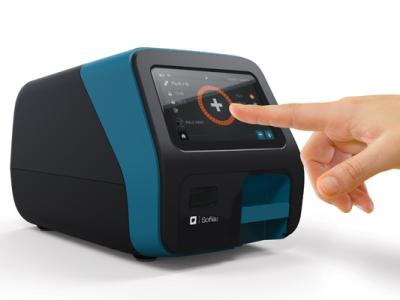Since the start of the pandemic, the FDA has issued emergency use authorizations to a whopping 444 diagnostic tests and sample collection devices to detect the COVID-19 virus. In recent months, however, those EUAs have been fewer and farther between, as the regulator has started to wind down its expedited reviews and urge testmakers to seek full market clearances instead.
The number of COVID tests that have actually made it through traditional regulatory pathways is still significantly dwarfed by those with EUAs, but the group is steadily growing. The latest addition arrived just this week, as QuidelOrtho announced Wednesday that its Sofia 2 SARS Antigen+ FIA has received de novo clearance from the FDA.
That makes QuidelOrtho’s test the first rapid antigen coronavirus diagnostic to land regular FDA clearance.
“As the first company to introduce a rapid antigen test for COVID-19 when the FDA granted Emergency Use Authorization for the Sofia SARS Antigen FIA in May of 2020, we are pleased to again be the first to receive de novo FDA clearance for our Sofia 2 SARS Antigen+ FIA,” CEO Douglas Bryant said in the announcement.
He added, “With this de novo authorization, Sofia becomes the predicate device upon which subsequent devices of the same type and intended use will be compared.”

Like the original Sofia test Bryant referenced—which snagged the first EUA for a rapid antigen test when the company was known as Quidel, prior to its $6 billion acquisition of Ortho Clinical Diagnostics—the Sofia 2 is designed for use at the point of care. Nasal swab samples are placed in the Sofia tabletop analyzer, which runs a lateral flow immunofluorescent assay to look for signs of the nucleocapsid protein associated with the coronavirus.
The new version improves upon its predecessor, however, by returning results within 10 minutes, compared to the 15-minute span of the first Sofia analyzer. Once each test is complete, the Sofia 2 system automatically adds the de-identified results to QuidelOrtho’s Virena data management system, where hospitals and labs can keep track of their patients’ data on a population level.
The Sofia 2 test was cleared for prescription use only. It’s meant to help diagnose COVID in people who are showing signs of an upper respiratory infection, and the test should be conducted within six days of the onset of those symptoms.
QuidelOrtho suggested that the tests be repeated at least twice over the span of three days, with at least 48 hours between tests—in line with study findings from the National Institutes of Health that outlined best practices for using rapid antigen tests to accurately diagnose COVID. The company also noted that negative results should be confirmed using a separate molecular test.
The first full FDA clearance for a COVID test came within the first year of the pandemic. In March 2021, BioFire Diagnostics secured a de novo nod for its Respiratory Panel 2.1, a PCR test that screens deep nasal swab samples for 22 pathogens associated with a variety of respiratory infections, including COVID, within about 45 minutes.
Since then, a handful of 510(k) clearances have gone to companies including BioFire, DiaSorin Molecular and Roche for additional molecular tests that are now able to help diagnose COVID even after the FDA’s EUA declaration has come to an end.